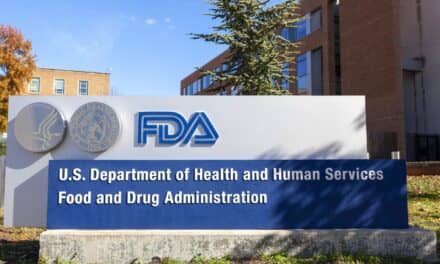FDA has approved FoundationOne Liquid CDx, Foundation Medicine’s comprehensive pan-tumor liquid biopsy test for patients with solid tumors. FoundationOne Liquid CDx is a comprehensive genomic profiling (CGP) test that analyzes more than 300 cancer-related genes and multiple genomic signatures to optimize patient care. Cancer is a disease of the genome, driven by genetic mutations within a tumor’s DNA. CGP is used to identify these unique mutations to determine how a tumor behaves and grows, and these insights can help physicians to determine a personalized treatment plan for each individual patient based on the specific mutations identified. In addition to approving FoundationOne Liquid CDx as a CGP test for patients with any solid tumor, the FDA approved the test for use as a companion diagnostic to identify patients who may benefit from treatment with certain prostate and lung cancer therapies, including Rubraca (rucaparib), a poly (ADP-ribose) polymerase (PARP) inhibitor for treatment in patients with BRCA 1/2-mutant metastatic castration-resistant prostate cancer, and three first-line tyrosine kinase (TKI) inhibitors for the treatment of patients with non-small cell lung cancer. By incorporating multiple genes, including several companion diagnostic biomarkers, the test can help save time versus sequential biomarker testing. “Many cancer patients are unable to have a tissue biopsy. FoundationOne Liquid CDx may provide a minimally invasive option for patients who otherwise might not have benefited from comprehensive genomic profiling,” says Levi Garraway, MD, PhD, Roche’s executive vice president, chief medical officer, head of global product development, and co-founder of Foundation Medicine Inc., Cambridge, Mass. “The convenience of testing a blood sample may also enable more rapid treatment decisions, so that patients can feel reassured they are not losing time to fight their disease.” FoundationOne Liquid CDx analyzes circulating cell-free DNA from a patient’s blood sample and uses massively parallel sequencing to detect the four main classes of genomic alterations. The test is FDA-approved to report short variants in 311 genes including rearrangements and copy number losses in BRCA1 and BRCA2 genes. The results are delivered in an integrated report that identifies alterations matched to FDA-approved therapies. The report also delivers information about genomic signatures, including microsatellite instability and blood tumor mutational burden, as well as single gene alterations, including all NTRK fusions, to help inform the use of other therapies including immunotherapies, and provides relevant clinical trial information. The FDA approval of FoundationOne Liquid CDx was based on analytical and clinical validation studies including more than 7,500 samples and 30,000 unique variants across more than 30 cancer types. Evaluation of the platform using multiple validation methods across a broad range of tumor types demonstrated high sensitivity and specificity, even at the low allele frequencies often observed in clinical blood samples.1,2 FoundationOne Liquid CDx is the latest addition to Foundation Medicine’s portfolio of high-quality CGP tests and the second of the company’s CGP tests to receive FDA approval. FoundationOne CDx, Foundation Medicine’s tissue-based genomic test for patients with solid tumors, received FDA approval in 2017. Together, these high-quality genomic profiling tests offer physicians important options for detecting specific genomic alterations that help guide efficient, personalized treatment decisions, while reducing the time and sample needed when testing for multiple biomarkers one at a time. FoundationOne Liquid CDx can also provide complementary insights to tissue-based testing regarding tumor heterogeneity (the differences between cancer cells), and clonal evolution (how tumors evolve over time). For more information, visit www.F1LCDxLabel.com. References 1. Foundation Medicine Inc. Internal data on file. 95% limit of detection (median) of 0.40% variant allele fraction (VAF) for select substitutions and indels, 0.37% VAF for select rearrangements, 21.7% tumor fraction (TF) for copy number amplifications, and 30.4% TF for copy number losses. 2. Foundation Medicine Inc. Internal data on file. 0% false positive rate for rearrangements and copy number alterations, 0.013% false positive rate for substitutions and indels. Featured image: BRCA2, a human gene and its protein product. Certain variations of the BRCA2 gene increase risks for breast cancer as part of a hereditary breast-ovarian cancer syndrome. 3d rendering.
FDA Approves FoundationOne Liquid CDx Liquid Biopsy Test




